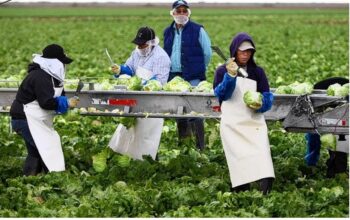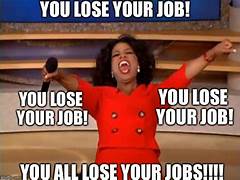In a democracy, people get to vote for elected officials and whether to join a union. California is not a democracy—just the opposite, it is a totalitarian State. So the Democrats pass a law that signed “cards” equal an election. No debate, no discussion, secret actions, some based on harassment, and a union can take over a farm.
“In a ruling issued Thursday night, Kern County Superior Court Judge Bernard C. Barmann, Jr. wrote that the company was being “forced to comply with a process that is likely unconstitutional.”
The decision halts every union-related proceeding at the company. That includes a weeks-long hearing the state Agricultural Labor Relations Board was holding over the disputed unionization, and over state officials’ allegations that the company illegally persuaded workers to revoke their support for the union. It also includes mediation to impose a collective bargaining agreement, which the labor board ordered last week.”
Newsom signed this bill—he is an enemy of Democracy—the perfect Democrat to run for President.
A California court just granted an ag giant a win. It could jeopardize new farm union law
BY JEANNE KUANG, CalMatters, 7/19/24 https://calmatters.org/california-divide/2024/07/farmworkers-california-unions/
IN SUMMARY
A judge has halted a union effort at the Wonderful Company, throwing into question a new state law designed to make it easier for agricultural workers to organize.
A California judge has halted a union effort at one of the state’s most powerful agricultural businesses, throwing into question the future of a 2023 law that made it easier for farmworkers to unionize.
The challenge was brought by the Wonderful Company, known for their pistachios, POM pomegranate juices and Halos tangerines. This spring, the state had certified a union at one of its nurseries that the company contested, setting off a flurry of legal filings.
In a ruling issued Thursday night, Kern County Superior Court Judge Bernard C. Barmann, Jr. wrote that the company was being “forced to comply with a process that is likely unconstitutional.”
The decision halts every union-related proceeding at the company. That includes a weeks-long hearing the state Agricultural Labor Relations Board was holding over the disputed unionization, and over state officials’ allegations that the company illegally persuaded workers to revoke their support for the union. It also includes mediation to impose a collective bargaining agreement, which the labor board ordered last week.
“We are gratified by the Court’s decision to stop the certification process until the constitutionality of (the new law) can be fully and properly considered,” the Wonderful Company wrote in a statement. “It is a victory for farmworkers, who, like all citizens, deserve the basic right to a fair election, a secret ballot, and a process free of fraud.”
While the decision is limited to the Wonderful Co., it’s not yet clear whether it will prompt the state to pause other farmworker union cases, some of which are also being challenged by employers. The Agricultural Labor Relations Board is “carefully reviewing the ruling and currently has no further comment,” executive secretary Santiago Avila-Gomez said today.
The Wonderful case would have been the third and most prominent victory for the United Farm Workers under the law. They won Gov. Gavin Newsom’s reluctant signature in 2022 by marching to Sacramento and securing President Joe Biden’s public support.
It was hailed as a symbol of the UFW’s resurgence during a post-pandemic period of rising labor activity, after years of membership declines and a stinging 2021 U.S. Supreme Court defeat that made it much more difficult for union organizers to talk to workers on growers’ property.
In a statement, UFW spokesperson Elizabeth Strater said the union hopes an appeals court overturns Thursday’s ruling.
“The ruling ignores 89 years of labor law precedent saying an employer must go through the election objections process before seeking judicial intervention,” Strater said. “There is already a process to address wrongdoing in elections and Wonderful was in the middle of that process.”
Here’s what to know about farmworker unionization in California:
Why did farmworkers and advocates want the new law?
The law allows California farmworkers to form unions using the “card check” method, common for public sector unions, that involves turning in signed cards supporting a union from a majority of workers, rather than by holding an in-person election at work as previously required.
Workers’ advocates argued this protects workers from employer pressure and retaliation, which they say farmworkers often face, especially more than half are undocumented immigrants. Growers pushed back, arguing there would be little way for employers to check the validity of the signed cards.
How many farms have unionized?
Since last fall, the Agricultural Labor Relations Board has certified five farmworker unions under the new law, board records show, including at Wonderful Nurseries.
The rollout hasn’t been smooth.
Growers’ associations have spent millions running advertisements on Spanish radio networks and other platforms discouraging farmworkers from unionizing, the Sacramento Bee has reported. The industry has also objected to what they say is confusion in how the new law works; the labor board this month was still scheduling hearings on formal regulations to implement the law.
Four of the five employers have objected to the new unions, which prompts the board to investigate and hold administrative hearings.
READ NEXT
The labor board has dismissed the objections of the first company that unionized, the tomato packers DiMare Company, though the business is appealing. Hearings were ongoing in the objections of produce grower Ho Sai Gai Farms. The board recently dismissed the objections of Vieira Agricultural Enterprises, a sweet potato farm.
In one case, that of Olive Hill Greenhouses, the employer filed no objections and is bargaining a contract.
What happened at the Wonderful Company?
Both sides have accused the other of misleading and manipulating workers.
The United Farm Workers in February filed a petition showing it had submitted signed cards from the majority of the nearly 600 grapevine and nut tree workers it sought to represent at Wonderful’s site in Wasco.
The company, owned by the billionaire Resnick family, filed objections a week later accusing the union of tricking farmworkers into signing union cards during meetings intended to help them apply for federal pandemic aid checks. They included signed declarations from nearly 150 workers saying they did not understand they had signed to support a union. Some of those workers also held rallies against the unionization; the company has said they clocked out and weren’t paid for that time.
The labor board certified the union, with officials later saying they were operating under the law’s strict timelines for doing so.
The union filed complaints before the board alleging unfair labor practices.
On April 22, board officials echoed them. The board’s general counselJulia Montgomery filed a complaint alleging the company had violated state law by holding mandatory meetings with workers, company human resources officials and a company-hired labor consultant to persuade workers to sign declarations objecting to the union.
The human resources officials, Montgomery wrote, read from a Spanish-language script “firmly” asking workers not to sign union authorization cards and then set up meetings with the consultant who had prepared declarations for them to sign.
What does the lawsuit say?
Administrative hearings in all those matters were ongoing when the company sued the state, calling the entire law unconstitutional and arguing its due process rights had been violated.
The company, Wonderful’s attorneys argued, shouldn’t have to be ordered to bargain or sign a contract with a union whose existence it was contesting. The state, and the UFW, argued that the labor board was already hearing the company’s challenges and Wonderful could still appeal that decision later.
After a hearing in June, Judge Barmann agreed with the company, writing Thursday that Wonderful had “credibly” argued the union’s certification was made in error.
The suit drew the interest of powerful agricultural companies and national industry groups. The carrot company Grimmway and berry giant Driscoll’s, both of which tried to file briefs supporting Wonderful. The National Right to Work Legal Defense Foundation, a group that files lawsuits seeking to undo unions, represents some of the workers who claim to have been misled in the case.
In an emailed statement, foundation vice president Patrick Semmens wrote that “card check” should not be used at all for union certifications. The method, in use for decades, is allowed under the National Labor Relations Act for all other private-sector workers — though employers who object can (and often do) prompt an election.
“The situation Wonderful Nurseries workers are facing represents an especially egregious example of why Card Check should be abolished as a method of determining employee support for union affiliation,” foundation vice president Patrick Semmens wrote in an email.




The State is in control. They make the rules and they can change the rules to suit themselves, their agenda and their money supporters. This is California democracy. They can bankrupt an individual or a business because they are insulated from their wrongful acts. That is why the businesses that can are leaving California. Farmers can’t leave. So, even if they win, they lose.
Rico is completely correct! Rich demorats push unions upon mostly unlearned farm workers to enhance their reputations of being for the little guy, except they are not. Greedy wealth attack dogs hate business and have no concept of economics. This will raise the already high cost of food in California and may even drive out producers to other states. We were once the breadbasket of the nation as well as the GDP capital of the US, no longer in an unfriendly business climate.
Not only will this hurt the farm workers by finding ways to automate, but poor economic class consumers also get cheated of nutritious foods because of costs.